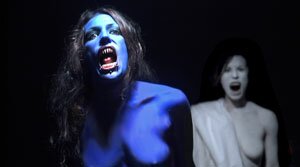ESSAY- Locally shot: The Zen horror movie that works

Lora Lee Jones (not shown) and Lara Blake and Ashley Florence (quite shown here) star in Mantra, a film written and directed by Brian Wimer and available on DVD through mantramoviesite.com.
Photo by Sallah Baloc
As we snowball to financial, social, moral, and material apocalypse, a storyteller can offer us the modest comfort that if everything's not going to be precisely okay, at least the networks won't launch any new CSI spin-offs next season.
And what medium does local best, but indie film? The neo-localist movement, with its home-knit mittens that fit like Ziploc baggies and heritage tomatoes that look like malignant tumors, gives us more than wormy produce and scratchy sweaters. It gives us Brian Wimer.
This guy is brilliant. Six foot four (he edges out our other best local filmmaker, Johnny St. Ours, by about a half-inch), raffishly handsome (Errol Flynn with aberrant facial hair), he's a Hollywood slickster (I tried to buy a ticket to his show and wound up asking for his autograph). He also has a serpentine mind for juggling people and ideas, and nobody likes him.
Charm, poise, genius, and universal loathing. Who could ask for better in a visionary, someone who looks good in Armani while you're stoning him to death? And, in a way, he's receiving a stoning: he makes great art, and nobody notices.
Mantra is his latest work, and it's making a solid showing at U.S. festivals, winning awards and audience acclaim. His advertising of it reveals his own twisted cleverness. He's too confident to fear labels, and he deliberately taunts a potential audience to ignore the film by printing his cinematic formula: zombies, tits, and gore at ten minutes apiece. And he delivers, by the second-hand on my watch, each of these.
But somehow, in what time remains on the clock, he shocks the audience into disbelief that they've just seen a DIY genre-piece. At a sparsely attended showing at Vinegar Hill, audiences seemed not to know what the hell to make of it, but in the out-procession nobody said "zombie" and nobody said "slasher." About the most literate critical comment I heard was "whoa," and that was from a UVA professor.
A handful of average-looking actors get into an average bus and go off on an average New-Age Retreat. Wimer plays the guru, and in five screen-minutes steals the film; to the extent that the hoariest part of the suspense in the oeuvre is the edge-of-seat hope that Wimer might appear again, and again, and again on-screen to wow us more. The film unrolls, and stuff happens.
We're never quite clear what that stuff is, and it makes not the slightest difference to enjoyment of it. There are Zen pronouncements that while delivered with irony somehow manage to settle on the viewer like the real thing; I found myself repeating them as if I'd just sat at the knee of Dalai Lama.
Flashback, flash-forward, funny interactions between realistically differentiated characters, long-angle shots of faces twisted into boredom-shock-confusion-beatitude, those infinite moments of camera stillness watching someone stir a pot, then a frightening downpour of synesthesia and jumpcuts and just-plain-weird visuals.
Then the final credits roll. Abel Okugawa's music haunts the thing, a trance of temple-bells and three-chord Ommms.
Was there a plot? Maybe. Did the film start-develop-culminate-resolve? Maybe. Did a character change? Maybe.
Did the audience leave wanting more, wondering more than they imagined they would, wishing they knew what the hell was going on? Absolutely.
Wimer buses us in and buses us out, and we wonder where we've been for over an hour: pure escapism and pure art, the art of out-of-body transport, an abduction.
Mind this: Mantra uses all the tricks of the horror film for suspense and the avant-garde film for art. It is as horrific an art film as I've seen, and as artful a horror film as I've seen. Yet somehow Wimer's Hollywood-without-Hollywood wit knows better than to make Mantra wholly either. It is not a didactic or exploratory yawn. It is not a formulaic or re-tread nail-biter.
We see breasts but can't take the time to notice whether they are shapely or perky, see gore and barely notice it's gory, violence and barely notice it's violent.
And that is Wimer's gift to us, that somehow he delivered absolutely on his promise that Mantra would be every zombie-gore film you've ever seen, and that you'd never have a second's sense that you had just seen one.
This is the most polished Charlottesville film work I've seen to date: cinematographically gorgeous; a created world of its own, perfectly consistent and drawn; unique and differentiated characters, doing smooth acting; a lush-lush-lush soundtrack.
I'm not sure we need to care, and I'm not sure Wimer would care, that we don't have a clue what it's all about. In The Big Chill, a 1983 movie with too much plot and too much soundtrack and too much to tell us, William Hurt delivers flawlessly that film's anti-thesis, and it sticks to Mantra: "Sometimes, you've just gotta let art kinda flow over you..."
~
Matthew Farrell reads cvillenews.com, which first published a longer version of this review, and he launched the Hypocrite Press in 1991.
#